Avery Aames: The Long Quiche Goodbye
September 5, 2010 by David
Filed under Fiction, WritersCast
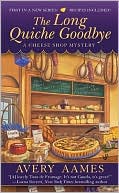 978-0425235522 – Berkley – Mass Market Paperback Original – $7.99 (also available as an ebook 978-1101188644 at $6.99)
978-0425235522 – Berkley – Mass Market Paperback Original – $7.99 (also available as an ebook 978-1101188644 at $6.99)
I don’t often read mysteries, but a few weeks ago, right in the middle of summer, the season for entertaining novels (often known as “beach reads”) I decided to give this novel a try. The tongue-in-cheek title first caught my attention, and I really liked the unusual setting for the novel (small town Ohio) and the quirky but very believable cast of characters. So The Long Quiche Goodbye is definitely a fun read but not just a throwaway summer book. Avery Aames is a good writer and she has deft with her creation and handling of characters.
As I mentioned, I am not a steady reader of mysteries, so I may not be as experienced as some are with the various forms and formats of mysteries – they do fall into a set of recognizable patterns, I know. In The Long Quiche Goodbye, our main character is Charlotte Bessette, the proprietor of the family owned cheese shop called Fromagerie Bessette, in the small town of Providence, Ohio. At the gala re-opening of the store after a full scale renovation and modernization, the store’s landlord (whom we already know not to like) is found stabbed to death with one of the store’s knives, and Charlotte’s grandmother is the prime suspect.
We’re off from there, with a full cast of local characters, friends, family, police, and a couple of other prime suspects in town to make things interesting. And it’s Charlotte who takes the lead in finding out who the real killer must be, as clearly, she feels (and we come to feel as well) that it could not have been her wonderful grandmother (who is the Mayor of the town!)
Avery Aames had a lot of fun writing The Long Quiche Goodbye, I think, and her pleasure and involvement with her characters comes across in the way she writes their story. I also had a great time talking to her about this well written book, her work as a writer, and the next books in the series that this book inaugurates. It looks like this series will be successful, and deservedly so – this first in the “Cheese Shop Mysteries” is already a national bestselling mystery novel. You can visit Avery’s website to learn more.
Podcast: Play in new window | Download
Kamran Pasha: Shadow of the Swords
August 28, 2010 by David
Filed under Fiction, WritersCast
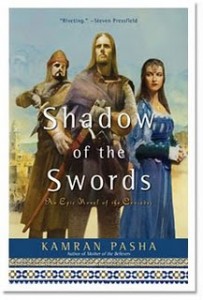 978-1416579953 – Washington Square Press – Paperback Original – $16.00 (e-book edition $9.99)
978-1416579953 – Washington Square Press – Paperback Original – $16.00 (e-book edition $9.99)
I love reading really good historical novels. I’m actually not sure how I found out about this book, but I knew I wanted to read it when I learned that the author, Kamran Pasha, is a Muslim writing about the Third Crusade from a Muslim perspective. That’s definitely a fresh concept. It turns out that Pasha is a terrific writer, and a deft story teller.
It’s almost impossible for Western readers not to think about the Crusades from the Christian side. The Third Crusade, headed by Richard the Lion-Heart, is one of the best known stories ever told, and our knowledge and understanding of the great Muslim ruler Saladin is without doubt cast by the Western version of the story. In Shadow of the Swords, we see things very differently, and not just the Muslim side, there are intriguing Jewish and female characters who are integral to the storyline in many fascinating ways.
Some of the characters and events in this book are based in reality, others are made up, but they are always consistent and believable. By inserting the fictional Miriam, daughter of the historical Maimonides into the story of Richard and Saladin, Pasha is able to link their personae and the real historical events of the battles between them into a much more personal context, which helps bring these complicated characters to life. We realize as the story unfolds that through their opposition, the two main characters will come to know, understand, and appreciate the other, both literally and figuratively. Which is a lesson our modern society could stand to learn too.
Kamran Pasha is a prolific writer. He has created novels (his first book was Mother of the Believers, another historical novel), television (Kings), video games (Blood on the Sand), and is now currently working on a theatrical film as well. He came to writing through an interesting career – he holds a JD from Cornell Law School, an MBA from Dartmouth and an MFA from UCLA Film School. He spent three years as a journalist in New York City before he went to Hollywood to become a full time creative writer.
I really enjoyed reading this book, and talking to Kamran Pasha was a terrific experience I hope you will also enjoy. And do enjoy this serious, well written and very compelling novel. It’s literate, well written and packed with interesting ideas that lives up to its billing as an “epic novel.” Pasha blogs passionately about many current issues at his own website, well worth a visit.
Podcast: Play in new window | Download
Dale Pendell: The Great Bay: Chronicles of the Collapse
August 21, 2010 by David
Filed under Fiction, WritersCast
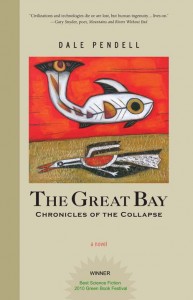 978-1556438950 – North Atlantic Books – Hardcover – $21.95
978-1556438950 – North Atlantic Books – Hardcover – $21.95
This is an amazing novel. Consider it a work of “ecological science fiction” as some have called it. I found it captivating, terrifying, incredibly emotive and reading it becomes almost a spiritual exercise. Pendell posits a worldwide collapse of population from a biological war gone amok. More than 95% of humanity disappears, almost overnight. He actually does not spend much time on this part of the story, horrific as it is, because that catastrophe is really just the lead in for the much bigger story of what happens next.
Aside from the critical principle of understanding, that modern human society will simply collapse, that going back to prior technologies becomes impossible because people no longer have the knowledge or skills, to live the way our ancestors did, and critically, cannot relearn them overnight in the face of societal collapse, the central tenet of this novel is that climate change will have been unleashed by what modern society *has already done* to the natural world. The computer models of planetary climate change are simply not able to fully contain and predict the massiveness of what is about to happen to the planet and the natural world that inhabits it.
The novel is essentially a brilliant imagining of what might or could be the future of the planet over the next hundreds, thousands of years, based on the supposition that humans have already begun this process of change. It’s a rich set of interlocking stories, mostly focused on the area that is known today as California, a bio-geographic landscape that author Pendell knows well, and imagines changing in profound and sometimes painful ways for the reader of his story.
This is a very unusual novel – really the main character is the planet and there are no traditional heroic human characters at its center. While we might search for and find labels for it (“dystopian” or “utopian,” “science fiction” or even “parable”), I’d rather think of it as a kind of vision-telling, a myth in the making, that seeks to change the way we think about ourselves. Indeed, there is a great deal of suffering and difficulty in the book, and at the same time, a powerful sense of continuity, what truly sustains. As the great poet Gary Snyder (who is a fictionalized character in the book, as it happens), says about the novel: “Civilizations and technologies die or are lost, but human ingenuity–families, tribes, and villages, the musicians, shamans, philosophers, and people of power–live on.” I’d add that not only does human ingenuity live on, so does Gaia, our planet home, adjusting and re-adjusting its inner and outer being, regardless of which or how many humans may be hanging on for dear life.
In my conversation with Dale, we talked about his background as a writer, poet, biologist, and how this brilliant vision of a book came into being. It’s an interview and a book I’d recommend to all my friends and colleagues – it’s impossible to read and not do alot of thinking about the future, as well as what we need to do about it – right now.
Podcast: Play in new window | Download
Gayle Brandeis: Delta Girls
August 10, 2010 by David
Filed under Fiction, WritersCast
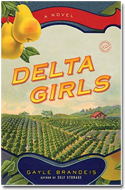 978-0345492623 – Ballantine – Paperback – $15.00 (also available as an e-book at $9.99)
978-0345492623 – Ballantine – Paperback – $15.00 (also available as an e-book at $9.99)
I think I have been lucky lately – I keep finding new novelists I have never heard of before, whose work turns out to be really good. Literary discovery is very exciting. Gayle Brandeis is one of those novelists whose work is completely new to me. Delta Girls is her third novel for adults, and she has one other for young adults. Her social awareness as a writer has been recognized for a previous novel (that I now want to read) called The Book of Dead Birds – it won Barbara Kingsolver’s Bellwether Prize for Fiction in Support of a Literature of Social Change, which I consider high praise indeed. One of Gayle’s great accomplishments in Delta Girls is to include a strong undercurrent of social awareness in a way that enhances the story and does not in any way intrude on one’s enjoyment of the novel and its characters.
Delta Girls is a terrific novel (great cover too, and yes, I do think the overall book package does contribute to the experience for the reader). Its construct is unusual – each chapter is the alternating story of two characters whose relationship is not divulged until nearly the end of the book. First is Izzy, who with her nine year old daughter Quinn, is constantly on the move as an itinerant fruit picker in California. As the story opens, they arrive at a pear orchard in the Sacramento River Delta. As with all her stops, Izzy has no intention of staying very long. But the orchard, its locale, and the family that owns it has a strong attraction for both Izzy and Quinn, and they both allow themselves to become involved and attached to the orchard and its people. We know that Izzy has a secret in her past, and that she has worked hard to stay away from the public eye, but events occur that put her in the middle of developments in the Delta and she will have to risk everything to save the ones she loves.
In the alternating narrative of the book, we meet Karen, a rising young star in figure skating with a pushy mother and a powerful and attractive new skating partner. Nathan is sexy, dangerous, and deeply attractive to Karen. As she reaches her 18th birthday, events come to a head in an unexpected and very public way.
Each main character is faced with a sudden thrust into the spotlight, and of course their narratives become more connected — but you will need to read the book to find out the surprising way their lives will intersect.
This is a very satisfying novel to read, with great characters, and of course the pear orchard and the Delta of the Sacramento River is a terrific backdrop for the book. The author’s deep love for her characters as well as her understanding of the power of place, and its influence on people’s lives show constantly throughout the novel.
Gayle is a thoughtful and accomplished writer whose work I am really pleased to have discovered. It is writing I want to explore more deeply. Talking to her about this book was a pleasure I am happy to share here. You can visit Gayle’s website here to learn more about her work.
Podcast: Play in new window | Download
Justin Kramon: Finny (A Novel)
August 5, 2010 by David
Filed under Fiction, WritersCast
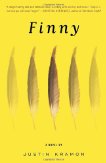 978-0812980233 – Random House – Paperback – $15.00 (also available as an ebook at $9.99 or less)
978-0812980233 – Random House – Paperback – $15.00 (also available as an ebook at $9.99 or less)
Finny is a wonderful first novel, a coming of age novel (and more), at the center of which is a wonderful character – Delphine “Finny” Short of course. This is Justin Kramon’s first novel, and he is a very good writer. He’s been writing and publishing short stories up to now, in literary magazines like Glimmer Train, TriQuarterly and elsewhere, but I think his future lies in the longer form a novel affords.
This novel begins when Finny is 14, and continues on through many more years of her life, with many adventures, and a large cast of really well drawn characters. Many reviewers have mentioned Dickens as a comparative, and that is apt, as Justin himself makes clear that the Dickensian model was on his mind when he was writing this book. He does very well with the large story arc, which gives the author enough room to really explore the inner life of his major characters.
Life is complicated, relationships that seem to have promise fall apart, and sometimes we have to deal with surprises in the way things actually work out. As Finny says herself about life, it is “hilariously funny and devastatingly sad. And only if you saw both things could you ever have a realistic idea of the subject.’’ It’s hard not to agree with the author and his character on this point, especially after spending time with Finny and her life story.
So even though there’s much in Finny’s life that is difficult, sad or disappointing, in both family relationships, love life and friendships, overall, her character comes through as positive about life and how she has lived it, somewhat idiosyncratically, and with a good bit of humor. That’s probably true of the author as well, and it’s a compelling journey for the reader. There’s a lot of richness here, and a thoroughly enjoyable novel it is.
I also enjoyed talking to Justin about his book, its characters, how he came to write this novel, his work as a writer and where he is going in the future. He’s got a really good sense of himself as a writer,an engaging personality, and a fine command of his craft at this early stage of his career. I think there’s much more good work to come from this novelist, work I will certainly be looking forward to reading.
I do also want to mention Justin’s website, which is one of the better author or book sites I have seen lately. There’s alot of fun stuff there, especially fun is the section called “Finny’s World” where the characters in the novel are drawn as imagined by artist David Ostow. It’s definitely worth a visit.
Podcast: Play in new window | Download
Michael Burke: Swan Dive
July 29, 2010 by David
Filed under Fiction, WritersCast
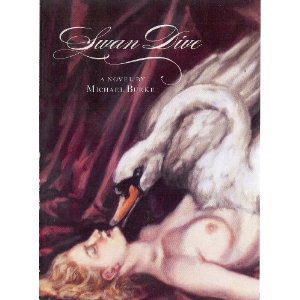 978-1929355501 – Pleasure Boat Studio/Caravel Books – paperback – $15.00 (also available as an e-book at $9.99)
978-1929355501 – Pleasure Boat Studio/Caravel Books – paperback – $15.00 (also available as an e-book at $9.99)
This is Michael Burke’s first novel, and it’s a good one. He is probably much better known as a sculptor and graphic artist; he is clearly an accomplished writer as well, and as with his art, there is a great deal of thought behind the manifestation he has chosen for this story. Michael Burke is also the son of renowned philosopher and poet Kenneth Burke, which may help explain some of his accomplishments.
While I was preparing to interview Michael about his very well written and entertaining novel, I read a fascinating profile of him and his work as an artist in the Harvard Alumni Magazine, an article that in itself is well worth reading.
This is an intellectual novel, but it is never heavy handed. The dialogue is smooth, funny, and vibrant. The story pays homage to Leda and the Swan but that motif never gets in the way of the story, and it’s not even necessary to know any Greek mythology to enjoy the book, which unfolds naturally. Of course we know there is a denouement coming, it’s a murder mystery after all, but there is plenty of complexity to keep us interested and engaged.
Swan Dive‘s main character, Johnny “Blue” Heron, is a modernized Dash Hammett sort of hero, smart, mouthy and alot more in need of help than he realizes. The book has many interesting and engaging characters, an unpredictable narrative, some sex, and an overall verve and political awareness that makes clear the author is socially engaged and has something important to say about the world we live in. You can read this book purely for fun, or as a neo-noir genre revival novel, but there’s alot more going on here for anyone who wants to delve into its many layers.
Swan Dive is a book I will recommend to mystery lovers who want a book with depth, a fast paced narrative and interesting characters. In my discussion with author Michael Burke, we had a lively discussion about this book and how he came to write it, his background as an artist, and where he is headed as a writer (there’s another Blue Heron novel in the works). I’m definitely looking forward to reading more of his writing.
Podcast: Play in new window | Download
Jason Turbow and Michael Duca: The Baseball Codes
July 22, 2010 by David
Filed under Non-Fiction, WritersCast
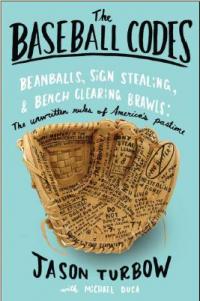 978-0375424694 – Random House – $25.00 (e-book editions also available at $9.99)
978-0375424694 – Random House – $25.00 (e-book editions also available at $9.99)
The subtitle of this book is long but tells you why almost any baseball fan (and some cultural anthropologists and sociologists) will be interested in this book: “Beanballs, Sign Stealing, & Bench Clearing Brawls: The Unwritten Rules of America’s Pastime.”
This is both an entertaining and fun read. It will work for serious fans of course, but just as well for more desultory followers of baseball, and really even readers who only have a passing interest in baseball. The basic notion is that baseball has had unwritten codes of conduct covering all sorts of on and off field behavior, probably for as long as the game as been played professionally. In years past, it would have been unusual for anyone outside of the closed professional baseball fraternity and maybe the regular baseball writers and broadcasters to know the details of how “the code” works.
The code is really a set of home grown rules, in some instances expressing sportsmanship, in other instances expressing the underlying social (and economic) values between players and teams. It is really fascinating to think about just how comprehensive human beings are in creating ad hoc systems of governance. The formal rules of the game, enforced by team owners, leagues and ultimately the Commissioner of baseball are written down and codified, as are the contracts between players and teams. The day to day rules of behavior among players, of course, are unwritten, passed on from one generation to the next, and highly subject to interpretation, ongoing disagreement and of course the change in social mores and behavior in the overall culture as well.
To write this book, Turbow and Duca spent a great deal of time talking with former and current players, coaches and managers. They are able to report back about the code, past and present, but the richness of the book lies in their many anecdotal examples of its application. And of course how the code has actually changed over the years as baseball and its players have changed is another theme of the book.
The Baseball Codes express and amplify not only the great Game of Baseball itself, but the richness of human culture and its history. This book was alot of fun for me to read, I knew some of the stories, but there were many more that were new to me, or which, by hearing the players talk about them, enabled me to understand much better what I knew about some of the interesting events in baseball history. Talking to co-author Jason Turbow was also great fun. He’s a passionate observer of the sport of baseball, and knows how to tell great stories. It’s the middle of the 2010 baseball season as this interview is posted, and a great time to listen to some baseball lore. And the Jason maintains an active blog that will keep fans up to date on current code behavior, also fun and recommended.
Podcast: Play in new window | Download
Lee Kravitz: Unfinished Business
July 15, 2010 by David
Filed under Non-Fiction, WritersCast
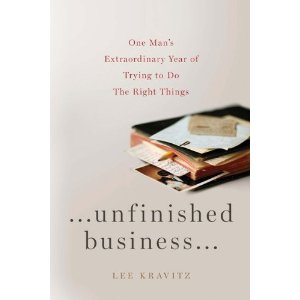 978-1596916753 – Bloomsbury – Hardcover – $25.00 (also available as e-book in various formats $9.99)
978-1596916753 – Bloomsbury – Hardcover – $25.00 (also available as e-book in various formats $9.99)
Well admittedly I might have liked Unfinished Business because I am roughly the same age as the author, have been through similar experiences in the same era, and like Lee Kravitz, have to confess to being something of a workaholic. Like him, when I look back on my past, I worry about some of the people I used to be friends with I no longer see, and doubtless, like him, have some “unfinished business” in my life that I’d be better off dealing with.
Today there must be literally thousands, hundreds of thousands of people who share many of Lee Kravitz’s experience of losing his job and having a crisis of identity, of being, and who like he did, feel a desperate need to reintegrate their lives, and their singular sense of self. Not everyone will have the opportunity to take the journey that he did, a full year of exploration and reconnecting with family, friends, teachers, people who literally made him who he is today.
I don’t think you have to literally share Lee’s direct experience, or feel as fragmented as lost as he did then to gain deeply from reading his book and sharing his journey. Lee spent many years as a journalist and editor, and writing seems to come easily to him. Many of his experiences are brilliantly described, and his honesty and clarity go a long way to making this book work for readers. This book can be transformative for many people who feel that modern life has separated them from those they once felt closest to, perhaps inspiring them to close their own circles and remake their own lives. Enough people have responded that way for the author to create a website “My Unfinished Business” on just that subject. I suspect that if you like this book, or even our conversation about it, his site is well worth a visit.
I very much enjoyed talked to Lee about his book and some of the stories about his family, friends and others whose stories he told in Unfinished Business. He’s as good a storyteller talking as he is writing.
Podcast: Play in new window | Download
Gene Kritsky: The Quest for the Perfect Hive
July 8, 2010 by David
Filed under Non-Fiction, WritersCast
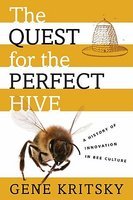 978-0195385441 – Oxford University Press – Hardcover – $24.95
978-0195385441 – Oxford University Press – Hardcover – $24.95
I have never kept bees, but am in love with honey, and the idea of beekeeping has always fascinated me. Gene Kritsky, who describes himself as “stung with the love of bees,” has written a wonderful book that will appeal to serious beekeepers, amateur bee lovers and even general readers with an interest in the history of humanity’s relationship with nature. The book is beautifully illustrated with amazing photographs, drawings and woodcuts representing hundreds of years of beekeping history.
Humans discovered honey thousands of years ago and have been working with these amazing insects for a very long time. What is interesting to the novice reader is how little beekeeping has changed. There have been many innovations in beekeeping, especially so during the past couple hundred years, but traditional beekeeping methods still exist in many parts of the world. And there is much that we can learn from past practices to help us understand how to stave off the epidemic of hive collapse that has become prevalent in so many places during the past few years.
Kritsky uggests that beekeeping’s long history may provide us with clues to help modern beekeepers fight the decline in honey bee numbers. Kritsky takes readers through the history of beekeeping, from early mud-based horizontal hives to the ascent of the simple straw skep (the inverted basket which has been in use for over 1,500 years), from the Golden Age of hive design in Victorian England up to and into the present day. In concise terms, aided by illustrated exampes, he talks about what has worked, what has not worked, and sometimes the things we have forgotten about hives of the past that might help counter the threats to modern bees and beekeeping. While scientists have now sequenced the honey bee genome and advanced our knowledge, we still keep bees in hives that have not changed very much during the past hundred years. Kritsky argues that we must start inventing again if we are going to save our bees. Thus the search for the “perfect hive” continues.
Gene Kritsky is a master of his subject in both depth and breadth, and thus is an easy author to interview. Doubtless he could talk in depth for hours about bees and maintain the listener’s interest. It was a pleasure to talk to him about this interesting and unusual book, and I am confident that listeners will enjoy our conversation as well.
Podcast: Play in new window | Download
Marc Simont: The Beautiful Planet: Ours to Lose
June 20, 2010 by David
Filed under Art and Photography, Children's Authors, WritersCast
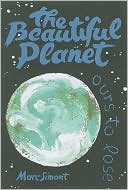 978-1935212-09-6 – Easton Studio Press – Paperback – $15.00
978-1935212-09-6 – Easton Studio Press – Paperback – $15.00
The Beautiful Planet: Ours To Lose is an impassioned anti-war cartoon book by one of America’s foremost illustrators. Marc Simont’s drawings, taken from five decades of editorial cartooning, capture the essence of a brooding Nixon, a smiling Reagan, a bland Bush One, and a dumbfounded Bush Two as they prosecute their wars. Simont’s fierce portrayals of the Military-Industrial Complex are intimately linked to his passionate indignity on behalf of all civilians, soldiers, and prisoners who have suffered.
Continually struck by the majesty of the planet as it floats in space like a jewel, Simont asks, will it survive? Born in Paris in 1915 to Catalonian parents (his father was himself a world renowned illustrator), Marc Simont spent his childhood in France, Spain and finally the United States, where he settled in 1934. After serving time in the U.S. Army during World War II, Simont went on to illustrate over a hundred books working with a wide range of authors, including Margaret Wise Brown, Red Smith, and James Thurber. Simont received the Caldecott Medal in 1957 for his illustrations to A Tree is Nice by Janice May Udry and a Caldecott Honor in 1950 for The Happy Day by Ruth Krauss. He is the author/illustrator of seven books, most recently The Stray Dog (2001), which won yet another Caldecott Honor, was chosen by The New York Times as one of the ten best illustrated books of the year, became an ALA Notable Children’s Book and received the Boston Globe-Horn Book Honor Book Award.
Internationally acclaimed for its grace, humor and beauty, Marc Simont’s art is in collections as far afield as the Kijo Picture Book Museum in Japan. He was chosen as the 1997 Illustrator of the Year in his native Catalonia and received the Hunter College James Aronson Award for Social Justice Journalism in 2008.
Interviewing Marc about this terrific book was a special occasion for me. I love the illustrations he has done for so many exceptional children’s books, many of which I know well, having read them to my own children. I was lucky to have the opportunity to work with him in producing The Beautiful Planet, which collects the pithy, humane and piercing political cartoons he has been making and publishing in The Lakeville Journal since the 1940’s. In this conversation, we talked about his early life, coming to America, his early work as an illustrator, his many well known collaborators, and of course his political cartoons that are collected here in this, his newest book.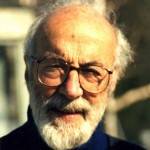 Marc’s approach is never to attack, but always to expose fallibility. He is a wonderful man whose work is marked by a love for humanity and an appreciation for actual human beings; he is a true humanist and a brilliant artist.
Marc’s approach is never to attack, but always to expose fallibility. He is a wonderful man whose work is marked by a love for humanity and an appreciation for actual human beings; he is a true humanist and a brilliant artist.
Podcast: Play in new window | Download
